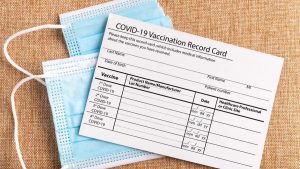Vaccination Status: Why We Have to Ask
Vaccination Status: Why We Have to Ask
Samantha Badr
I know, I know – another COVID article. But before we get started, let me first apologize for my absence. I know my fans have missed me but it’s hard work being an HR professional! Since the beginning of this journey, my goal was to develop skills in the career field I so carefully chose. As of today, I can finally say that I have done just that – and I owe it all to this blog. Thank you for sticking around as I navigate my career path and share lessons I’ve learned along the way. This is just the beginning, and I plan to share my experiences with you all. Stay tuned….
The last few weeks were COVID-focused at my organization. That came with a lot of tasks that landed on my makeshift home-office desk. The first item on my to-do list was updating job posts company-wide. I had to make sure that the new COVID language was present and easily digestible for potential candidates. Because my organization hires a lot of field staff workers, we had to make sure to disclose that we comply with all state and federal laws. Whether that be weekly COVID tests or vaccine doses, employees must disclose their status to qualify for employment. I also had the pleasure of following up with current employees who have not yet disclosed their vaccination status. However, contrary to popular belief, the EEOC allows companies to ask for vaccine disclosure – and no, it’s not a HIPPA violation.
Employment law attorneys recommend that organizations practice caution when crafting their vaccination policies to ensure they do not ask for too much information. Employers should be careful to not “dig too deep” to avoid the potential of making medical inquiries that go against the Americans with Disabilities Act (ADA). Asking for proof of a COVID-19 vaccination is permissible under the ADA because it is not likely to prompt an employee to provide disability-related information.
Still, organizations should make sure to keep up to date with applicable state laws, which could differ from federal rules and guidelines. If employers require workers to get vaccinated, they will need to consider reasonable accommodations for employees with disability-related or religious objections. However, the U.S. Equal Employment Opportunity Commission (EEOC) has said that employees may still decline to confirm their vaccination status for reasons that are unrelated to a disability. To summarize, employers ARE allowed to ask about vaccination status, but they ARE NOT allowed to ask follow-up questions about why an employee did not receive a vaccination.
Even if employees willingly disclose their vaccination status, it is still considered medical information that must be kept confidential. If employers do require such proof, they should control access to the information and limit its use. The best way to address employee privacy concerns is to communicate that such records will be strictly confidential and will not be used to make employment decisions.
Regardless of differing company-specific regulations, all organizations are similar in that they are trying to navigate these new policies as they emerge. There will be some push-back, and some employees will not be happy with certain rules. It’s crucial to remain firm when communicating new policies. Organizations – my “professional advice” is to always keep the human aspect alive and remind yourself that your employees are genuinely (and rightfully) scared for their safety. It might not be the most comfortable situation, but I promise it’s for the best. If all else fails, use any parent’s favorite line – “you’ll understand when you’re older”.
Good luck and stay safe!
For helpful tips this cold and flu season, please refer to the video below 🙂
